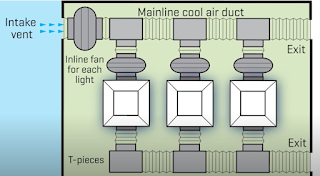Set the air-cooled planting lights in the correct way to open up some really interesting areas in the plant world to indoor gardeners, but there is still a lot of confusion about how to set the air-cooled planting lights correctly. They allow indoor gardening throughout the year in warm months, and No need for additional air conditioning. Now, air-cooled reflectors work by allowing cold air to pass through the lamp during operation. The most common design is a horizontally mounted lamp with flanges on both sides to introduce cold air in the above two situations. The designed warm air is designed based on vertically installed lights. The main principle is to use a constant air flow to transfer the heat from the lights and reflectors to the indoor garden. Here we use the six-inch VANQ LED Grow Light, The 720-watt ultra-high solar LED Grow Light powered by the VANQ safety-controlled galaxy electronic ballast can even be a lighting controller. Let us continue to the trickiest part to circulate the air. You need to connect a tandem exhaust fan to the reflector, and many growers ask them if they should place the exhaust fan in front of the reflector so that the cold air can be blown to the lamp tube or rear light.
The reflector makes it absorb warm air. Does anyone ask this question really make any difference? Let's first look at how to ideally set up a single air-cooled lamp to establish some basic principles, you should get air from a dedicated input like this in an adjacent room with cool air, or from a cool outdoor wall and duct directly into the air-cooled reflector , Please use flanged pipes and Jubilee clamps to form an airtight seal. At the same time, it is important to make the pipe as straight as possible. Remember to give yourself enough slack so that you can grow light and lower the nextlet regarding air filtration and Discussion of fan location Embedded exhaust fans are usually designed to be placed near the outlet vents so that they can draw or suck in air from the room. When used as part of an air-cooled lighting system, it is best to blow air above the lamp, because your in-line fan is the location of the air-cooled reflector. Not only does blowing cool air reduce wear and tear, compared to always sucking in warm air, the fan motor The air will tear, but you will better control the air circulation in and around the garden. Positive pressure will be generated inside the air-controlled lighting ventilation system (if there is a leak), and the air will splash into your garden and be caused by others. On the one hand, your Gardensventilation system sucks to create negative pressure inside your air-cooled lighting ventilation system, so any leaks will suck in unfiltered air in your garden.
You should replace the lamp every six to nine months to disconnect the power and unscrew the glass cover. The reflector has a quick-release screw. If the lamp has been in operation recently, your life will be easier for at least half an hour. Cool, then unscrew the lamp screw, use a piece of authorized thin paper to rotate the lamp counterclockwise, screw the new lamp clockwise into the accessory to avoid leaving fingerprint marks on the lamp. The clip fixes the air duct to a port on the reflector, and then connects the other end of the air duct to the air outlet of the six inchinline fans. Set the air-cooled lights in the correct way and they can clear up to 70% The heat generated by the growth lamp glass panel and the air-cooled reflector do absorb some light, especially ultraviolet rays, so it is important to keep the reflector glass panel clean, free of dust and no fingerprints. Finally, simply set up multiple air-cooled grille lights, you can connect them in series like this, but inevitably you need a reflector. The end of the series will be warmer than the reflector at the beginning. Usually, you should not connect more than two. 6-inch air-cooled reflectors or more than four 8-inch reflectors to achieve maximum cooling efficiency, to introduce a trunk air-conditioning pipe, and use t pipes to provide services for each light, using the same principle to extract air.

